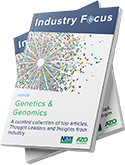As part of its ongoing efforts to eradicate childhood cancers, the St. Baldrick's Foundation has awarded University of Colorado Cancer Center member Kelly Faulk, MD, a St. Baldrick's Scholar grant to investigate a new method for treating infant leukemia.
"Infant leukemia -; which we define as leukemia in patients under 12 months old -; is often very difficult to treat," Faulk says. "Even though the majority of these patients will enter a remission, where their leukemia seems to be responding to therapy, the rates of relapse are very high. A majority of these babies will end up experiencing relapse within the first year, and once it comes back, it's really hard to treat."
Infant leukemia can be diagnosed in children as young as newborns and can develop in utero. Symptoms include fever, fatigue, swollen lymph nodes, weight loss, trouble breathing, an extremely high white blood cell count, and enlarged liver and spleen. Around 160 infants are diagnosed with the disease each year, according to the National Library of Medicine.
Targeting a genetic change
The St. Baldrick's grant will aid Faulk in conducting a clinical trial of SNDX-5613, a new medication that targets a specific genetic change that occurs in infant leukemia. The drug will be administered, along with traditional chemotherapy, to infant leukemia patients whose disease has come back or proven resistant to typical treatment. The trial is slated to open in early 2023 and run for three to five years.
"All of us in the field are very excited about the data coming out about this medication that inhibits this specific genetic change that happens in infants with leukemia," Faulk says. "Right now, we have very few options to offer these patients and their families."
Tapping the network
In addition to testing the safety and efficacy of the inhibitor drug, researchers will study patients' blood and bone marrow samples to better understand how the drug functions in fighting leukemia. Since pediatric cancer is so rare -; as a pediatric oncologist at Children's Hospital Colorado, Faulk treats on average one case a year -; the trial will be conducted through the Children's Oncology Group (COG), a pediatric oncology consortium that unites more than 10,000 experts in childhood cancer at more than 200 leading children's hospitals, universities, and cancer centers across North America, Australia, New Zealand, and Europe.
Genetics & Genomics eBook

Compilation of the top interviews, articles, and news in the last year.
Download a copy today
"Kids get cancer way less than adults do, so we're dealing in rare populations," Faulk says. "For a trial like this, we have to work together at hundreds of sites. That means not only that we're able to give all of those patients access to this new medication that's under investigation, but also hopefully we can enroll patients faster so that we can understand if the drug is safe, what the side effects are, and also if it's effective, which is obviously what our hope is."
Increased effectiveness
The inhibitor drug has previously been tested in adults with two types of leukemia -; acute lymphoblastic leukemia and acute myeloid leukemia -; and a small population of pediatric patients, where it has shown efficacy even when used without complementary chemotherapy. Faulk's study will be the first to test it in very young patients, adding chemotherapy drugs in hopes of more effectively treating the cancer.
"Our hope is that combining it with chemo will be even more effective," Faulk says. "Also there are a lot of differences between a 65-year-old and a 15-month-old. We need to look at the metabolism of the drug in these young patients, and to see if the drug is doing what we think it is. We will study the leukemia cells to see if it is really targeting what we think it is and how effective it is."
If the trial proves successful, Faulk hopes the combination of medications eventually will be approved not just for patients whose pediatric leukemia relapses, but for use as a first-line treatment for infants newly diagnosed with leukemia.
"My biggest hope is that we can reduce the relapse risk, and thus overall outcomes for these babies, so I don't have to tell these families at diagnosis that their child has more likelihood of relapsing than not." Faulk says. "That is the reality right now."
University of Colorado Anschutz Medical Campus
Posted in: Child Health News | Medical Science News | Medical Research News
Tags: Acute Lymphoblastic Leukemia, Acute Myeloid Leukemia, Blood, Bone, Bone Marrow, Breathing, Cancer, Cell, Chemotherapy, Children, Clinical Trial, Drugs, Efficacy, Fatigue, Fever, Genetic, Hospital, In Utero, Leukemia, Liver, Lymph Nodes, Medicine, Metabolism, Myeloid Leukemia, Oncology, Spleen, Weight Loss, White Blood Cell
Source: Read Full Article
